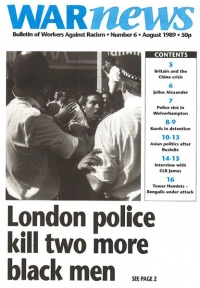Workers Against Racism
LM network resources
|
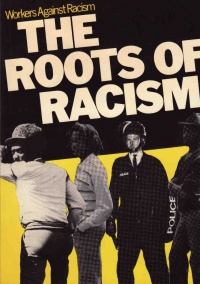
Workers Against Racism is associated with the Revolutionary Communist Tendency/Revolutionary Communist Party, the forerunner of the libertarian anti-environmental LM network. It was led for a period by Keith Teare. Active in the 1980s, it is now defunct. Workers Against Racism was in existence from early 1979 via its initial grouping called East London Workers Against Racism, according to leading activist Keith Teare.[1] Its main periods of activity were in 1981 especially in London and Coventry and then in 1985 around the rebellions in the inner cities. A second wave of activity occurred in the early 1990s where WAR activists - predominantly in London - targeted racist violence, raise the issue of the treatment of refugees and developed their policy of targeting liberal and left anti racist work as opposed to taking on the far right such as the British National Party.
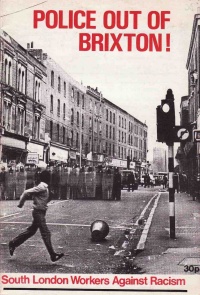
Contents
Orientation
Beginnings
Workers Against Racism started as a locally based group called East London Workers Against Racism in 1979. It took direct action against racist violence. Kenan Malik was a member in the early 1980s and gives the following account:
- ELWAR was a radical anti-racist movement, which had been set up by a small Trotskyist group called the Revolutionary Communist Party, but which had become something of an institution in east London because of its willingness to take direct action against racists. It set up street patrols, ensured the physical protection of families under attack, and organized local meetings, often in people's front rooms, to win support for those facing harassment or worse. In the case of the Saddiques, 'direct action' meant staying in the house, physically confronting the youths whenever they gathered, and canvassing the local area, house by house, shop by shop, both to win support for the family's plight and to find out more about their tormentors. All of which explains why I spent much of 1984 not at University but camped out in a house in London's East End.[2]
Endings
The position of the RCP and WAR on racism and racist organisations evolved such that by the end of the Party and on into the LM network racism was an issue they mainly dealt with by either defending the rights of the far right to free speech or by attacking anti-racist organisations. Thus, writing, of the LM network post RCP Dave Renton, a former (brief) sympathiser, notes: 'Most of the former party fronts which the RCP had run continued: although some folded quicker than others. What was the point of Workers Against Racism, when the RCP was neither pro-worker nor anti-racism?'[3]
In an earlier post Renton had shared his memories of the RCP in Sheffield in 1995-8[4]:
- I remember being in Sheffield in 1995-8, when the main activities of the group were to promote showings of such films as Leni Riefenstahl's Triumph of the Will. Leading BNP activist Mark Collett always boasts[5] that he joined the BNP, through the activities of one such RCP front, 'When I came to Leeds University I joined the Free Speech Society to fight against political correctness. Then a BNP speaker got expelled, which I thought was absurd. He invited me to a BNP meeting in Burnley and I felt right at home. They were my kind of people.' He made the same point at his recent trial.[6]
Former RCP activist Graham Barnfield, challenged this writing that[7]:
- I remember organising various activities in Sheffield and Leeds in the same period, most of which were conducted around anti-militarist issues. A couple of free-speech film screenings in the Steel City were Romper Stomper (an anti-fascist film) and Birth of a Nation, which the narrow anti-fascists wanted to ban. These were both screened some time before 1995, if memory serves. I don't recall a Triumph of the Will showing. Meanwhile, Mark Collett, who comes from the same school catchment area as me but is way younger, was set to become a Leeds University alumnus in May 2002. That meant Collett missing out on punch-ups with my comrades by at least three years, as the RCP was dissolved in 1996.
Of course the point is that the dissolution of the RCP was accompanied by a series of 'continuity RCP' organisations, that can be characterised as the LM network. There seems to be little dispute that Collett was active in the Leeds Free Speech Society. The THES records him in April 2001, as a leading activist in the group when reporting attempts by the society to overturn Leeds 'No platform' for fascists policy:
- Student leaders are worried that the hard right is gaining ground in universities after evidence of British nationalist groups moving in on several campuses. Leeds, Leicester, Derby and Nottingham universities are being targeted by racist groups such as the Patriotic Students' Association, Students for Britain and the National Student Front.
- At Leeds University, a meeting of the Free Speech Society, led by rightwing activist Mark Collett, was cancelled after complaints from anti-Nazi groups. A university statement said: "As organisers of a potentially controversial meeting, the Free Speech Society has failed to give adequate notice so that... security arrangements can be put in place." The society campaigned for Leeds students' union to drop its "no platform for racists" policy but its motion was defeated.[8]

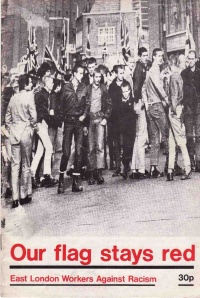
Activities
- 8 September 1990 - 'Hundreds of people today marched past the United States Embassy in London in protest against western military intervention in the Gulf. Demonstrators chanted "Britain, US, UN, out out out" as they filed past Westminster and on to a rally in Hyde Park. The protest, which police said passed off peacefully, was at-tended by about 800 people. The Ad-Hoc Hands Off the Middle East Committee, which organised the event, claimed the support of a dozen groups including the Revolutionary Communist Party, the Irish Freedom Movement, the Student Committee to Defend Arab Rights and Holy Places, and Workers Against Racism. Organisers' spokesman Keith Tompson said: "It went quite well considering it was organised so quickly. I think we will be viewed as a cranky minority at the moment but it's the price we pay for being the first to say we disagree."[9]
- 9 April 1992 WAR stood in the General Election in Holborn and St Pancras gaining 133 votes (0.3%)[10]
- 29 September 1993 - 'TWO anti-racist organisations accused Scotland Yard yesterday of failing to uphold the right of the British National Party to demonstrate after its members were arrested in east London at the weekend before they could gather. Police arrested 57 BNP members as they made their way towards Brick Lane, but no attempt was made to arrest any of the more than 1,000 Anti-Nazi League members who gathered in the area to protest against them... Liberty, the civil rights organisation that has been a leading campaigner against racial discrimination, said the police had failed in their duty to protect the right of the BNP to make a protest. John Wadham, legal officer for Liberty, said the organisation condemned the racist views of the BNP which wants all non-whites repatriated to their countries of origin but upheld BNP supporters' right to express them-selves. In a democratic society, that right is one of the most fundamental for citizens, Mr Wadham said. It is incredibly dangerous for the police to tinker with it. His criticisms were echoed by Workers Against Racism, one of several groups that took part in the week-end demonstration against the BNP. Sharmini Singh, its spokeswoman, said that the police had committed what amounted to a dangerous infringement of civil rights. It is much better if we deal with this problem ourselves, Ms Singh said. Accepting the police's right to tell people where they can and cannot stand, what they can and cannot say, is a recipe for disaster. Police yesterday defended what they described at the time as their bold and unusual action. They said their actions had prevented violence between BNP members and the Anti-Nazi League for the third weekend in a row in Brick Lane.[11]
- 5 October 1993 - 'A hundred police were on duty tonight as newly-elected British National Party councillor Derek Beackon at-tended his first council meeting. Between 40 and 50 protesters shouted and waved placards outside before the meeting in the heart of London's docklands... The protest passed off peacefully and there were no arrests. Superintendent David McDonald said 100 police officers were used and he put protesters' numbers at 48. ... Organisers of the protest, East London Workers Against Racism, said they were protesting against the council's housing policies over many years, first under Labour, then under the Liberal Democrats, rather than against Mr Beackon.[12]
- 19 March 1994 - 'An extra doctor has been drafted into a detention centre to help monitor nearly 100 asylum seekers who have refused food for 13 days in a protest. At one stage up to 150 detaineees from Asia, Africa and South America were said to be on hunger strike at the Campsfield House immigration detention centre, at Kidling-ton, near Oxford. ... Meanwhile, a demonstration in support of the hunger strikers was being held in east London today. Sharmini Brookes, spokeswoman for the East London Workers Against Racism, said: "In this country asylum-seekers are treated like criminals. They are interned without trial."[13]
- 24 April 1994 'Protesters plan to march to a police station tomorrow to demonstrate against racist attacks after a vicious assault on an Asian student. Shuhel Miah, 17, was slashed with a Stanley knife from his mouth to his neck and across the back of his head in a gang attack in east London last Wednesday. He needed 32 stitches and was "stable" in the Royal London Hospital in Whitechapel today. Workers Against Racism, which is organ-ising the march to Limehouse police station, hoped he would be released in time to take part.... The protest is being led by Mukith Miah, no relation of Shuhel, who is standing for Workers Against Racism in St Dunstans ward in the local elections.'[14]
- 25 April 1994 - 1700 LONDON Poplar Park, Poplar High Street. March to Limehouse police station.[15]
- 27 April 1994 - 'PROTESTERS occupied a police station for two hours last night after a woman fell to her death from a twelfth-floor balcony when police and a court bailiff called at her flat. It is believed that Kwande Slizba, 27, may have mistaken them for immigration officials. She is said to have been trying to climb down to the balcony below while other people in the flat were questioned. Witnesses said that Ms Slizba, thought to have been a Nigerian, had wrapped washing line around her waist before lowering herself, a procedure she had used before. The line broke and she fell more than 120ft. Later about 60 protesters, mainly from the left-wing group Workers Against Racism, waved placards and shouted: Racist police! Murderers! at Stoke Newington police station, north London. The group said in a statement that Ms Slizba was an illegal immigrant and claimed she had lived in fear of immigration police.'[16]
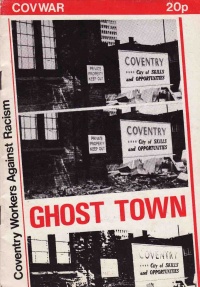
People
- Mark Butler, London organiser circa 1992;[17]National organiser circa 1993[18]
- Keith Tompson, 'joined Workers Against Racism on its formation in 1979 and was the East London organizer from 1981 to 1983... since 1985 Keith Tompson has been National Organizer of Workers Against Racism'[19]
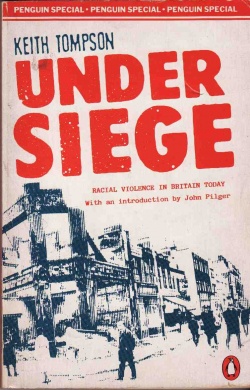
Publications
1981
- Our Flag Stays Red. East London Workers Against Racism. Revolutionary Communist Pamphlets, No.9. Junius Publications, London 1981, 1st edition., April 1981. Pamphlet. 15 pages. illustrated.
- Roberts, Pat & Drury, Christina. Police out of Brixton! South London Workers Against Racism. Revolutionary Communist Pamphlets No.10. Junius Publications, London, 1981., April 1981. Booklet. 17 pages, photo illus. Original photo illus.card covers.
- Landa, Inez & Helen Simons. Ghost Town. Coventry Workers Against Racism. Revolutionary Communist Pamphlets, No.11. Junius Publications, October London, 1981. Pamphlet. 13 pages, illustrated.
- Workers Against Racism Cleansing our ranks: A platform for anti-racist trade unionists, London: Junius Publications, December 1981, 11 pages.
1985
- Workers Against Racism, The Roots of Racism, London: Junius Publications, January 1985. ISBN 0-950 8404-8-3. Written by Keith Tompson[20]
- Workers Against Racism, Racism: The spectre haunting Europe, leaflet, 1985.
1988
- Keith Tompson, Under Siege: Racism and Violence in Britain Today., with a foreword from John Pilger, Penguin, 1988
1989
- Workers Against Racism, War News Number 6, August 1989.
1992
- LETTER: THE REAL CHALLENGE TO RACISM BYLINE: MARK BUTLER The Guardian (London) September 19, 1992 SECTION: THE GUARDIAN FEATURES PAGE; Pg. 24.
1993
- Letter: Labouring under an illusion BYLINE: From MR MARK BUTLER The Independent (London) October 11, 1993, Monday SECTION: COMMENT PAGE; Page 17
Notes
- ↑ Keith Tompson, Under Siege: Racism and Violence in Britain Today., with a foreword from John Pilger, Penguin, 1988, p. i
- ↑ Kenan Malik, From Fatwa to Jihad: The Rushdie Affair and its legacy, London: Atlantic books, 2009, p.38
- ↑ Dave Renton Living Marxism, spiked online and the RCP Temporary Hoarding, 4/8 March 2006.
- ↑ Dave Renton 7 February: the new socialism of fools, 7 February 2006.
- ↑ Stuart Jeffries 'I'm drawn to a racially pure white society'Mark Collett is a student at Leeds University. And tomorrow he's standing in the local elections - for the BNP. The Guardian, Wednesday 1 May 2002
- ↑ http://www.dkrenton.co.uk/nick_griffin.html
- ↑ Graham Barnfield Internet dating, no date, but posted between 17 and 23 February 2006.
- ↑ Far right gains a hold on campus , Times Higher Education Supplement 6 April 2001
- ↑ Della Matthews WESTERN FORCES SHOULD LEAVE GULF, SAY MARCHERS Press Association September 8, 1990, Saturday
- ↑ The Independent (London) Election 1992: The full results April 11, 1992, Saturday, SECTION: HOME NEWS PAGE; Page 31
- ↑ Edward Gorman 'Anti-racist groups defend rights of BNP', The Times September 29, 1993, Wednesday
- ↑ Tim Moynihan 'BNP COUNCILLOR GOES TO FIRST MEETING', 'Press Association October 5, 1993, Tuesday
- ↑ Keith Manning, HEALTH WATCH ON HUNGER STRIKE DETAINEES, Press Association March 19, 1994, Saturday
- ↑ Tim Moynihan ANTI-RACIST PROTEST OVER KNIFE ATTACK' Press Association April 24, 1994, Sunday
- ↑ Press Association, April 25, 1994, Monday PROVISIONAL SCHEDULE FOR TUESDAY APRIL 26 SECTION: HOME NEWS
- ↑ Michael Horsnell 'Police besieged after death fall' The Times April 28, 1994, Thursday
- ↑ LETTER: THE REAL CHALLENGE TO RACISM BYLINE: MARK BUTLER The Guardian (London) September 19, 1992 SECTION: THE GUARDIAN FEATURES PAGE; Pg. 24.
- ↑ etter: Labouring under an illusion BYLINE: From MR MARK BUTLER The Independent (London) October 11, 1993, Monday SECTION: COMMENT PAGE; Page 17
- ↑ Keith Tompson, Under Siege: Racism and Violence in Britain Today., with a foreword from John Pilger, Penguin, 1988, p. i
- ↑ Keith Tompson, Under Siege: Racism and Violence in Britain Today., with a foreword from John Pilger, Penguin, 1988

